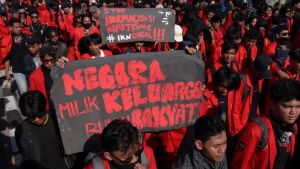The government plans to apply the Jabodetabek KRL rate based on the Population Identification Number (NIK) and the increase in Value Added Tax (VAT) starting in 2025. This is considered to have the potential to further suppress the purchasing power of the middle class, which is now shrinking in Indonesia.
The plan is considered not to take sides and facilitate the interests of the middle class. The former Minister of Finance, Chatib Basri, said that it would be wiser for the government to also pay attention to the interests of the Indonesian middle class. This is because the condition of the middle class has used their savings for consumption.
The lack of purchasing power of the people since the Covid-19 pandemic has not only been experienced by the poor, but also in the middle class. The difference, said Chatib, is that the government continues to pay attention to the poor through the provision of various social assistance. Meanwhile, the middle class, which has also decreased purchasing power, has not received attention. I think this is a very big issue. If this issue is not managed properly, the government can reflect on the phenomenon of the Chile Paradox in 2019," he said.
SEE ALSO:
Five years ago, in October 2019 to be precise, the Chilean government announced an increase in metro (subway) rates at the Santiago (state capital), amounting to 30 Peso Chile or around Rp500 during peak hours.
Even though it is only Rp. 500 (if converted), the fact is that the increase is considered burdensome for many residents, especially students and the middle class who are very dependent on public transportation. Protests began to appear by means of 'avoiding' tariffs.
Students refuse to pay the new tariff by jumping over the turnsdoor at every Metro station. Actions are also widespread, not only students, workers and other communities are doing the same thing. This protest then rolled out into the growing demonstration of the veils. The demands also expanded, not only canceling the tariff increase, but also related to social changes and broader economic policies.
Professor of Economics at UCLA Anderson School of Management who is also an economist of Chile, Sebastian Edwards called the economic, social and political turmoil the phenomenon of Paradox Chile, as stated in an article entitled The Chilean Paradox: High Growth, Low Inequality, and the Rise of the Middle Class.
Edwards assessed that the increase in metro rates at Santiago seemed to be an entry point for the Chilean people to convey their dissatisfaction with various government economic policies that seemed to lead to the middle class.
In fact, at that time the political and economic conditions of Chile were in a positive rate as reflected in various economic indicators. The average GDP growth of around 3 percent per year in recent years before the protests, the poverty rate continued to decline significantly in recent decades, to only 5-6 percent, one of the lowest in Latin America.
Not only that, the Human Development Index (HDI) in Chile is among the highest in Latin America, showing progress in the fields of education, health, and living standards. The per capita rate even touched the figure of 14,551 US Dollars much higher than Indonesia-and one of the highest in the South American region.
Unfortunately, this Chile positive economic indicator does not reflect the true distribution of wealth in the community. Despite having a relatively high GDP per capita, Chile is experiencing a high level of income inequality. Gini coefficient, which measures income inequality, is around 0.45, showing uneven distribution of wealth. The level of household debt in Chile is also relatively high, especially for education and health costs. This is a heavy burden for many middle class families, the majority of whom are.
Edwards said that although Chile has succeeded in making tremendous economic progress, there is still significant inequality in the distribution of wealth and access to quality public services. This creates frustration and dissatisfaction among the middle class who feel left behind and do not benefit from this economic growth.
Please Pay Attention to Middle Class!
What happened in Chile made Chatib Basri remind the Indonesian government to pay more attention to the middle class, to avoid the same phenomenon in the country. Especially at this time, the condition of the Indonesian middle class is facing a very difficult situation, along with the economic conditions that are still not fully stable.
Likewise in Chile, the Indonesian government has recently paid more attention to poor and very poor groups with various social assistance and the upper economic group with various tax incentives. Meanwhile, the middle class seemed neglected and had to bear the consequences of the unstable economic condition, almost without assistance from the government.
Therefore, it is not surprising that in the last five years the number of middle class in Indonesia, continues to experience a very significant decline every year. According to the World Bank, the middle class of Indonesia is those who have a expenditure range of 3.5 times to 17 times above the poverty line.
Meanwhile, middle class or middle class candidates are those who have an expenditure range of between 1.5 to 3.5 times above the poverty line. Meanwhile, the poverty line in 2024 is IDR 550,000.
Referring to this standard, data from the Central Statistics Agency (BPS) in 2019, the population of the Indonesian middle class reached 57.33 million people, while in 2024 the number was only 47.85 million people, down about 9.48 million people.
The decline in the number of middle classes does not mean that they advance to class, but instead go down to the middle class level. This is proven by the increase in the number in the class to 137.50 million people. Thus, half of the Indonesian population of 270 million people are middle class candidates who have the vulnerability to enter poverty.
This fact has made Chatib Basri predict that in the next few years the middle class will dominate the Indonesian population. According to him, this group does not need social assistance or cash, but rather good public facilities. They will need more on the quality of good education, better means of transportation. This will be a political economy issue going forward," he added.
Bank Permata economist, Joshua Pardede estimates, changes in public transport rates amid the rampant provision of car purchase incentives, including tax incentives for electric cars can lead to the phenomenon of the Chile Paradox in Indonesia.
"Initial indications of the occurrence of the Chile Paradox that may occur, because our economy remains only 5 percent solid, but there is no equitable equitable development, especially in the lower middle class," he said.
He explained that the plan to change the Jabodetabek KRL tariff based on NIK could disrupt middle class purchasing power because it is one of the main transportation tools for working class people whose homes are far from the industrial center.
"Because if we talk about this backward phenomenon, for example, the middle class is worried and highlights plans to increase or adjust the KRL rate, while on the other hand for electric car tax incentives, this is what enjoys the upper class," he said.
"That's why they feel injustice there, where large subsidies are still enjoyed by the upper class, while the middle class is even added to the burden of their lives, including the potential for adjusting the KRL rate, and also next year there is also the possibility for an increase in VAT rates," continued Josua.
Josua emphasized that the government needs to pay attention to the fate of the middle class by creating programs or expanding social protection coverage for this group, to avoid the occurrence of the Chile Paradox phenomenon.
He hopes that the story of the Paradox Chile phenomenon five years ago in a country that was once led by dictator Augusto Pinochet does not become a reality in Indonesia. Because, as in Chile, when the middle class in Indonesia fell, this country will also fall.
The English, Chinese, Japanese, Arabic, and French versions are automatically generated by the AI. So there may still be inaccuracies in translating, please always see Indonesian as our main language. (system supported by DigitalSiber.id)
















